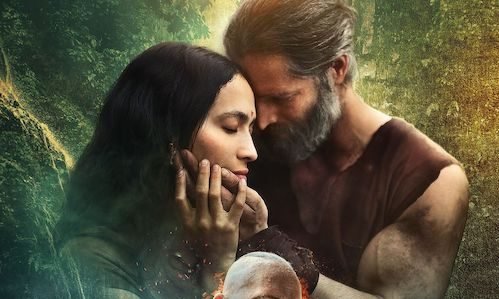Directed by: Darin Scott
Written by: Darin Scott and Michelle Scott
Starring: Darin Scott, Nora Dale, Karina Lombard, and Billy Zane
Runtime: 104 minutes
Pledging to watch ‘The Oath’ might cause severe regrets
“You are so boring, all your thinking.” – Bathsheba (Nora Dale)
After a brief opening chase scene through a crowded forest in director/co-writer Darin Scott’s “The Oath”, the camera focuses on the lead, Moroni (also played by Scott), a muscular 40-something donning a warrior’s garb, complete with, perhaps, a cowhide vest.
He’s thinking.
Moroni stands, sits, and lies down in a vast patch of lush emerald pasture near an ocean coast, and the thoughts in his head – for some reason - are spoken aloud through narration in his native tongue while subtitles appear. He’s alone, the sole survivor of the Nephite Nation.
By sight alone, one might guess that Scott’s movie might be set during the fictional Hyborian Age, thousands of years before 0 A.D., but this story takes place during the 5th century in North America, as noted during the opening credits.
Scott and cinematographer Brian O’Carroll offer a grand entrance for Moroni, a stoic gentleman who might let his sword do most of the talking. The Nephites’ opposing nation, The Lamanites – “after a millennium of war” – killed all of Moroni’s people.
However, only scarce swathes of swashbuckling sprint to the screen, mostly late in the third act, as “The Oath” is primarily a slow, clumsy, colloquial-dominated narrative, where Moroni speaks in parables and formalities to himself and Bathsheba (Nora Dale) from the opposing nation, The Lamanites.
He will utter, “Their words will cry from the dust.”
“If they slay me, it matters not,” Moroni also says.
The central plot revolves around Moroni coping with the fact that the Nephites’ history could be wiped clean after his demise. King Aaron (Billy Zane) of The Lamanites – who apparently only rules over 10 on-screen citizens in his kingdom - wishes to rid the world of Moroni. Meanwhile, the ruler’s mistress, Bathsheba, leaves him and finds this lone Nephite. The rugged Moroni and beautiful Bathsheba might pledge some common ground and romance.
Bathsheba is running from an abusive relationship, but Moroni becomes possessive after just a couple of weeks and asks that she never leaves him.
Come on, Moroni. Give her some space.
Well, Scott’s production may be a passion project because “The Oath” is a religious chronicle about an important figure for The Church of Jesus Christ of Latter-day Saints. Admittedly, this critic didn’t realize it until the end, but most moviegoers – with or without some research beforehand – will grasp this obvious fact. My agnostic beliefs and frequent critic practice of “walking blindly into a movie” (without knowing anything about it) drove my naiveté for this 104-minute picture.
So, looking back, Scott’s constant gravitas towards Moroni’s everyday tasks – like handing a plate of food to Bathsheba or strolling through the woods – now draw clarity due to the widespread reverence given to this religious figure.
So, I respect Scott and his cast and crew’s intentions to bring Moroni to the big screen.
Still, as a movie, I must unfortunately vow – from my perspective - that “The Oath” is a clunky, awkward experience. It feels like it was filmed on a shoestring budget – without accompanying footwear - in one location out in the wilderness, like if you and your friends decided to shoot a movie over a three-day weekend.
It’s filled with wincing, wooden dialogue, but the performances – as a whole – aren’t second-rate. However, Scott often runs into problems, because he seemingly can’t quite find the balance between portraying Moroni’s respected sobriety and delivering needed emotion in critical spots. When in doubt, Scott seems to lean on the former, which is a safe bet, but his interpreted stoicism hampers the intended poignant moments.
The strained choreography with the supporting players doesn’t help the film’s cause. For example, the Lamanite combatants seem connected by an imaginary rope, so they don’t fall out of the camera frame during their repeated steps over the same woodsy acreage or path adjacent to a small rocky cliff throughout the movie.
During the eventual fight scenes between King Aaron’s entire militia of 10 combatants versus Moroni, Bathsheba’s sister Mahigana (Karina Lombard) fires off two arrows that land, but we don’t see her pull on the bow. Still, through the magic of editing and our imagination, she did.
Take the editing department’s word for it.
Speaking of words, “The Oath” is a movie where members of the warring factions sometimes speak their distinct languages or sometimes break into English. The rule of thumb is that the longer the movie runs, the more English you’ll hear. If Scott filmed “The Oath” linearly, maybe the cast and crew said, “Hey, let’s just drop the other languages, okay?”
Although Zane delivers a slight Irish accent throughout his performance, which comes out of nowhere, but hey, at least he’s not boring with all his talking.
Jeff’s ranking
1/4 stars














